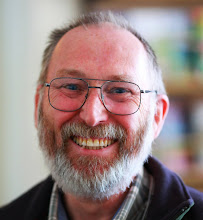Prayer Unceasing.
In my last letter to The Binsey Beacon (Sept 2009), I wrote about unceasing prayer, as advocated by Saint Paul in 1 Thess 5:17. I thought it might be helpful to expand a bit on what I mean by 'unceasingly'.
I have been studying the writings of the Holy Fathers, the so called 'Patriarchs of the Church', holy men who lived in the first centuries after The Resurrection of Our Lord. Some of these were taught by the Apostles, but all were very close in time to people who heard Our Lord speak – the oral tradition was still very strong. So I count their testament very highly. The study of their writings is called 'Patristics' for obvious reasons.
The study of Patristics has occupied the Eastern Church, The Orthodox in particular, throughout the years since, and many of the more recent orthodox writers have followed the tradition of the Holy Fathers too. It's interesting to note that of all the manuscripts (velum, parchment, and papyrus) that we still have from ancient times, the fragments of the Gospels and Epistles are the most numerous, and then the writings of Fathers about them. You can tell the popularity of a manuscript by the number of copies that were made – and hence the likelihood that they will survive the vagaries of time. This may be a good topic for another letter.
To return to prayer unceasing. It is pretty impossible to do nothing but say prayers all the time. You have to wash and dress and cook and work, otherwise you will die. This story about Saint Anthony the Great (c251-356) is helpful.
Abba Anthony fell into discouragement and a great darkening of thoughts, he said to God, “Lord, I want to be saved but these thoughts do not leave me alone - what shall I do in my affliction? How can I be saved?” A short while afterwards, when he got up to go out, Anthony saw a man like himself sitting at his work, getting up from his work to pray, then sitting down and plaiting a rope, then getting up again to pray. It was an angel of the Lord sent to correct and reassure him. He heard the angel saying to him, “Do this and you will be saved.” At these words, Anthony was filled with joy and courage. He did this, and he was saved.”
Even work is prayer if it is dedicated to God. Saint Gregory the Theologian (of Nazianzus) said, “remember God more often than you breathe.” Prayer is to be as natural to us as breathing, or thinking, or speaking. Somehow we need to get into the habit of prayer so that everything becomes a part of it. The point is briefly expressed in one of the Sayings of the Desert Fathers: “A monk who prays only when he stands up for prayer is not really praying at all.” (Anonymous) Saint Antiochus of the Monastery of St. Sabbas (7th C) , alludes to the words of Ecclesiastes 3:1-7 when he says: “There is a proper time for everything except prayer: as for prayer, its proper time is always.”
So when we speak of unceasing prayer we are not saying that the words must be said unceasingly, but we are saying that the mind must be in the heart, and the heart and mind turned constantly towards God, no matter what we are doing. Again then, I suggest to you that repeating a simple prayer a goodly number of times just after you awaken, will set the mind in the heart and on God. At frequent intervals throughout the working day further short periods of concentrated focus on God are needed. And finally to go to sleep with the prayer echoing in the mind: “Lord Jesus Christ, Son of God, have mercy on me, a sinner”.
Remember, at this time of year especially, that He came to give you Life. What are you going to give Him for Christmas: attention, adoration, love?
His Peace be with you all this Christmas and throughout 2010. Richard.

No comments:
Post a Comment